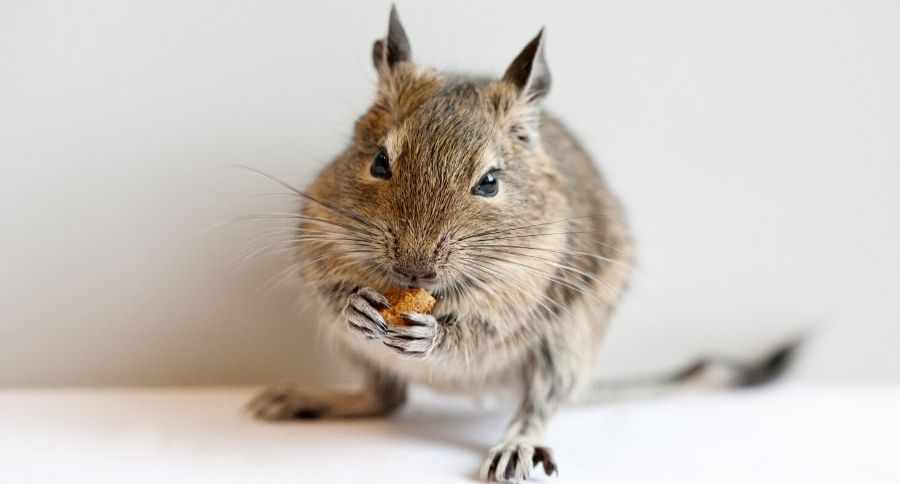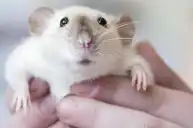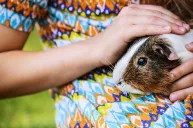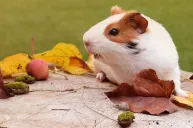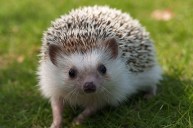These pet rodents are not nocturnal! Degus are very social and clean. If you're interested in keeping one as a pet, you'll need to clean their housing frequently and handle them a lot. This isn't a great pet for a beginner given the level of care they need.
We learned some cool facts about the degus.
- The average lifespan of a degu kept in captivity is 6-8 years.
- They need a lot of exercise, degus are curious animals.
- Diet! Degus do not regulate blood sugars as well as other rodents. You need to take care not to overfeed them or give them bad foods, otherwise, their health can deteriorate quickly.
- Before handling a degu, you need to be aware that they can and will shed their tail if they are mishandled.
Yet degus are adorable, so let's dive deeper on how to handle and care for these rodents.
Appearance and behavior
Degus—small rodents that occupy Chile, from the coastal plains to the mountains—make great pets.
According to PetMD.com, degus are as big as a guinea pig but with brown fur and a long, thin tail — they look like oversized gerbils. They have round, squat bodies, weigh between a half-pound and a pound, and grow to about 10-12 inches long, from nose to tail tip. The tip of their tail has a tuft of black fur, while their bellies are covered in tan fur, and they have bristly hair on their hind feet.
"These small rodents are extremely smart and can adapt to both nocturnal (night) and diurnal (day) sleeping patterns. They also develop medical conditions such as diabetes, separation anxiety, Alzheimer's-like signs, and ADHD-like behavior, making them excellent laboratory models to study these illnesses."
Degus personality (very social)
Does this pet fit your personality and lifestyle? Socializing with other degus in the same cage will satisfy some of their needs, but they respond well to being handled by people, especially from a young age.
Pets4Homes says it is not mandatory that you handle them regularly, but if you want to build a trusting and strong bond, it is suggested. The plus side is that it will be easier to move degus when it comes to cleaning out their cage.
What about their habitat?
The Spruce Pets helps pet owners with details about degu care when it comes to housing. Remember their habitat should reflect that these are social animals!
Your pet degus will need a solid surface exercise wheel for their home!
- Common degus need a large cage to live in.
- A minimum of 24 by 18 by 24 inches should house two degus comfortably.
- If you can go larger, definitely do, as multilevel cages built for hamsters, ferrets or chinchillas are ideal.
- Degus are avid chewers, making it necessary to source an enclosure made of wire, as they can eat their way through wood and plastic.
- A degu enclosure should also have a nesting box to replicate the burrowing they do in the wild.
- Provide nesting material in the form of tissues, paper towels, hay, or shredded paper. Paper-based bedding is safer and just as absorbent when changed out regularly. Shavings are the best solution.
Don't forget sweet potato, leafy greens, dandelion leaves and a water bottle may get chewed through, so opt for water bowls.
Degu care: Diet and health concerns
These little guys have a special diet! Pets4Homes shares that degus do not regulate blood sugars as well as other rodents. You need to take care not to overfeed them or give them bad foods, otherwise, their health can deteriorate quickly.
As far as diet, you can feed them chinchilla or guinea pig food mixes and food pellets. Along with hay, this will make up the bulk of their diet, and some occasional treats will not do much harm.
Do you know anyone that shares their home with a degu? We'd love to hear more! Please leave a comment below!
